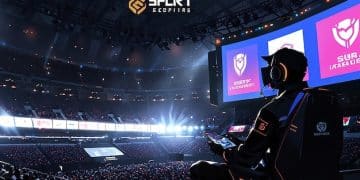Legal Considerations for US Esports Tournaments in 2025

Navigating the burgeoning US esports landscape in 2025 demands thorough understanding of evolving legal frameworks, encompassing contract law, intellectual property, data privacy, age restrictions, and gambling regulations, all critical for participant protection and competitive integrity.
As the competitive gaming scene continues its meteoric rise, particularly in the United States, understanding the intricate legal landscape becomes paramount. What are the legal considerations for participating in US esports tournaments in 2025? This question is not merely academic; it’s a practical necessity for players, teams, organizers, and investors alike, shaping the future of competitive play.
Understanding the Evolving Legal Landscape in US Esports
The esports industry, while rapidly expanding, operates within a legal framework that is still maturing. Unlike traditional sports, esports faces unique challenges, largely due to its digital nature and the relatively swift pace of technological change. This introduces a complex web of legal considerations that participants must navigate in 2025 and beyond.
Contractual Agreements and Player Rights
Central to participation in any professional or semi-professional esports tournament are the contractual agreements players sign. These contracts govern everything from salary and prize money distribution to intellectual property rights over in-game content and personal branding. Issues such as contract length, exclusivity clauses, termination conditions, and dispute resolution mechanisms are crucial.
- Clear Compensation Structures: Ensuring contracts explicitly define base salaries, prize money splits, streaming revenue, and appearance fees.
- Intellectual Property Rights: Understanding who owns rights to stream content, player likenesses, and potential in-game character designs.
- Termination Clauses: Clarifying conditions under which a contract can be terminated by either party, including performance clauses or breach of conduct.
- Dispute Resolution: Specifying arbitration or litigation procedures in case of disagreements, ideally favoring less costly, efficient methods.
Players must exercise due diligence, often seeking legal counsel, before signing any agreement. The imbalance of power between established organizations and aspiring players can lead to unfavorable terms if not properly scrutinized. The shift towards more standardized contracts, or at least common industry practices, is a slow but necessary evolution as the industry professionalizes.
Intellectual Property (IP) and Licensing
A fundamental legal consideration in esports revolves around intellectual property. This includes the game itself, owned by its developer and publisher, and various elements derived from gameplay. Tournament organizers often require licenses from game publishers to host events, use game assets, and broadcast gameplay. Players, in turn, may grant IP rights to their teams or sponsors for their image and content. Navigating these layers of IP rights can be complex, especially with user-generated content and live streaming.
The unauthorized use of copyrighted material, such as music in streams or game footage out of context, can lead to significant legal complications. Tournament organizers typically obtain broad licenses, but individual players streaming their participation need to be aware of the terms and conditions outlined by both the game publisher and the tournament organizer. The legal lines around IP ownership in derivative works, such as fan art or highlight reels, are often blurred and subject to ongoing legal interpretation.
Age Restrictions and Child Protection Laws
Given the appeal of esports to younger demographics, age restrictions are a significant legal consideration, particularly in the US, where state laws may vary. Many professional tournaments set minimum age requirements, often 16 or 18, to ensure participants are legally able to enter into contracts and accept prize money. For minors, parental consent or guardianship agreements are almost always required. This also ties into child labor laws in some states, which can impact the number of hours minors are allowed to practice or compete, and the educational protections they must be afforded.
Organizers must implement robust verification processes to confirm participant ages. Failure to comply can result in legal penalties, reputational damage, and disqualification of underage players. This area also extends to data privacy, specifically the Children’s Online Privacy Protection Act (COPPA), which governs the online collection of personal information from children under 13. While most competitive players are older, marketing and outreach efforts must be mindful of these regulations.

Data Privacy and Security Compliance
The collection, storage, and sharing of personal data, from player statistics to financial information, are central to esports operations. In the US, compliance with various state and federal data privacy laws is non-negotiable. While the US lacks a single comprehensive federal privacy law akin to Europe’s GDPR, states like California (CCPA/CPRA) have enacted stringent regulations. This patchwork of laws means organizations and players must be meticulous in handling personal data.
- Informed Consent: Obtaining clear consent from players for data collection and use, particularly for marketing or analytical purposes.
- Data Minimization: Collecting only necessary data and securely deleting it once its purpose is fulfilled.
- Security Measures: Implementing robust cybersecurity protocols to protect sensitive player data from breaches.
- Data Breach Notification: Having clear procedures for notifying affected individuals and authorities in the event of a data breach, as required by state laws.
Tournament organizers, teams, and even individual players who stream or manage online communities must be acutely aware of their obligations regarding data privacy. Non-compliance can lead to significant fines and legal action. The evolving nature of privacy laws means continuous vigilance and adaptation are necessary.
Gambling and Betting Regulations
One of the most legally intricate areas surrounding esports is gambling and betting. The legality of esports betting varies significantly by state in the US. While some states have legalized sports betting, explicitly including esports, others have not, or operate under grey areas. This poses challenges for tournament organizers, who must ensure their events are not perceived as illegal gambling operations, and for players, who must avoid participating in illicit betting activities or engaging in match-fixing.
Integrity is paramount. Organizations like the Esports Integrity Commission (ESIC) work to prevent match-fixing and other forms of cheating, collaborating with regulators and law enforcement. Players are typically prohibited from betting on their own games or those in which their team participates. The legal landscape here is highly dynamic, influenced by state legislative agendas and public perception. As more states regulate sports betting, there’s an ongoing debate about how esports fits into these frameworks, particularly concerning the definition of “sport” and the unique characteristics of digital competition.
Visa and Immigration for International Players
For international players participating in US-based tournaments, navigating US visa and immigration laws is a complex but critical legal consideration. Professional esports players typically require P-1 visas, specifically designed for athletes and entertainers. Obtaining these visas involves meeting stringent criteria, including demonstrating international recognition and having a sponsor (usually the tournament organizer or team) file a petition on their behalf. The process can be lengthy and requires meticulous documentation.
Challenges include the perception of esports as a legitimate sport by immigration authorities, differing interpretations of visa categories, and the sheer volume of applications. Delays in visa processing can prevent players from attending tournaments, leading to forfeited opportunities and significant logistical headaches. Teams and organizers often employ specialized immigration attorneys to manage this process, ensuring compliance and timely approvals for their international talent.

Anti-Doping and Fair Play Regulations
Ensuring fair competition extends beyond preventing match-fixing; it also encompasses anti-doping policies. While chemical enhancement might seem less prevalent in esports compared to traditional sports, substances like Adderall (a stimulant used for ADHD, but also as a performance enhancer) have been a subject of debate and regulation. Many major esports leagues and tournaments in the US have adopted anti-doping policies, often mirroring those of traditional sports bodies like the World Anti-Doping Agency (WADA), albeit with adaptations for the unique nature of gaming.
These policies prohibit the use of certain performance-enhancing drugs and may include requirements for drug testing. Players found in violation can face sanctions ranging from fines and suspensions to permanent bans. The legal implications for players include understanding what substances are prohibited, the testing procedures, and the appeal process for any adverse findings. Transparency and education are key to ensuring players understand and adhere to these regulations, maintaining the integrity and competitive spirit of esports.
Taxation of Prize Money and Sponsorships
For players, prize money and sponsorship earnings are taxable income. In the US, participants must understand federal and state tax obligations. For US citizens and residents, prize money is generally treated as earned income, subject to ordinary income tax rates. For international players, US tax treaties and specific withholding rules apply. Tournament organizers are often required to withhold a percentage of prize money for non-resident aliens, which can be recovered later through tax filings.
The complexity is compounded by varying state income tax laws. A player winning prize money in a state like California, which has high state income tax, will have different tax liabilities than if they won the same amount in a state with no income tax, like Florida. Consulting with tax professionals specializing in sports and entertainment is highly advisable for both domestic and international players to ensure compliance and optimize their financial outcomes, avoiding future legal repercussions related to unpaid taxes.
Ensuring Compliance and Future Preparedness
The mosaic of legal considerations for participating in US esports tournaments in 2025 demands a proactive and informed approach. For players, this means understanding their rights and obligations within contracts, being aware of IP implications, and adhering to age and integrity policies. For organizations, it involves rigorous compliance with a multitude of state and federal laws, from data privacy and gambling regulations to visa requirements and anti-doping protocols.
The industry’s rapid growth means legal frameworks are constantly playing catch-up. Staying abreast of legislative changes, precedents set by legal disputes, and evolving best practices is crucial. Collaboration between legal experts, industry stakeholders, and governmental bodies will be essential in shaping a clear, fair, and stable legal environment for esports. This ongoing dialogue will help transition esports from a nascent industry to a fully mature and robust professional landscape, where legal clarity underpins continued innovation and participation.
| Key Aspect | Brief Description |
|---|---|
| ✍️ Contracts | Thorough review of player, team, and organization agreements for rights, compensation, and obligations. |
| 🛡️ Data Privacy | Compliance with state and federal data protection laws like CCPA/CPRA, securing personal information. |
| 💰 Gambling Laws | Navigating diverse state regulations on esports betting and ensuring integrity measures are in place. |
| 🛂 Visas/Immigration | Securing appropriate visas (e.g., P-1) for international players and navigating US immigration procedures. |
Frequently Asked Questions about US Esports Legalities
▼
Yes, esports contracts are generally legally binding documents in the US, similar to contracts in any other industry. They outline terms and conditions, compensation, intellectual property rights, and responsibilities for players and organizations. It is crucial for all parties to understand and agree to the terms before signing, often advisable with legal counsel.
▼
Primary IP concerns include licensing rights for using specific games in tournaments, ownership of player likeness and identity, control over broadcast content, and rights related to in-game assets. Game developers typically own the core IP, and tournament organizers secure licenses, which often extend to player content created during events.
▼
US gambling laws significantly impact esports by defining where and how betting activities can occur. Each state has its own regulations, leading to a fragmented legal landscape. Tournament organizers must ensure their events, and any associated betting, comply with relevant state laws to avoid legal penalties and maintain competitive integrity.
▼
Yes, international professional esports players typically need specific non-immigrant visas, most commonly the P-1 visa, which is designated for internationally recognized athletes and essential support personnel. Securing this visa requires extensive documentation and sponsorship from a US entity, like a team or tournament organizer, proving the individual’s athletic distinction.
▼
Many major US esports tournaments and leagues implement anti-doping policies, often based on principles from traditional sports (like WADA). These policies prohibit performance-enhancing drugs and may include drug testing. Sanctions for violations can range from fines and suspensions to permanent bans, emphasizing fair play and competitive integrity.
Conclusion
The landscape of US esports in 2025 is one of immense opportunity, yet it is undeniably intertwined with a complex web of legal considerations. From foundational contractual agreements and intricate intellectual property rights to the nuances of data privacy, varied gambling laws, and international immigration hurdles, the legal terrain is multifaceted. Success in this burgeoning industry demands a comprehensive understanding and proactive adherence to these evolving regulations. Players, teams, and organizations that prioritize legal diligence will not only safeguard their interests but also contribute to the long-term growth and professionalization of competitive gaming, ensuring a fair and equitable environment for all participants.





